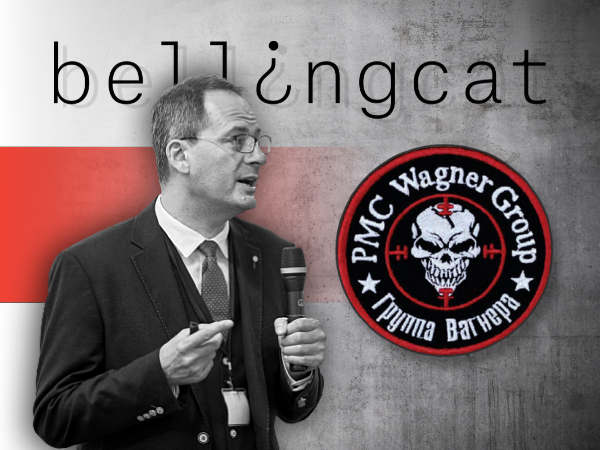In his speech at Kyiv media event ‘Mezhyhiria Fest’, Bellingcat investigative journalist Christo Grozev, opened up on his team investigation into foiled Wagner group capture, new confessions from Russian mercinaries, and tight-lipped reaction of Zelensky’s officials.
He said Bellingcat team learned the covert operation was coming in mid-summer of 2020.
‘We were following up some movements and telephone calls of mercenaries while investigating some other cases. We noticed something strange was going on – their trips to Belarus. We looked into it, started to trace those people on our own. It was not clear what it was all about, yet we understood there was this Ukrainian trace.’
Arrest of Wagner group in Minsk that soon followed was the last piece in the puzzle.
‘We reached out to former Ukrainian intelligence service people. Soon we got information that the operation was really happening [at the time] and they hoped Belarus would turn over the mercenaries to Ukraine. There was this period of hope for the people who worked in intelligence – they thought the operation was not perfect but it could be complete. In my view, it was naïve.’
Addressing the role of Belarus president, Grozev said Lukashenko was raising the stakes claiming he could turn over Wagner group [arrested in Minsk] to Kyiv while, in reality, he used them as ‘pawns’ to push for a better deal with Moscow.
The journalist stated taped calls and surveillance data obtained by Bellingcat is much in line with allegations that came from Ukrainian media reports.
‘There was an officially approved operation involving several intelligence agencies .. to seize these 33 mercinaries. Those men were important [as witnesses] and foolish enough to sign up with this fake military contractor group Ukrainian intelligence agents made up. And after that, for some legitimate or not reasons, the plan was put off for several days. .. There could be some reasoning, some involvement of other countries… It could be foolish, not criminal, idea that 3 more days would make no difference. But it could be a situation where someone did so deliberately not to ‘ruin’ relations with the Kremlin.’
Grozev said despite the failure with capture of Wagner group in Minsk, Ukrainian intelligence agencies should be given the credit for evidence on involvement of Russian mercenaries in Donbas war and MH17 flight downing.
According to the Bulgarian journalist, Ukrainian officials keep sidestepping the issue- Zelensky’s top aide Andriy Yermak just refused to provide comments on the foiled operation.
‘We have enough information to prove, without bias, that there was such information. The [Ukrainian] government does not want to acknowledge that all that evidence can be used in courts, which could hamper the [investigation of] MH17 crash case.’
Grozev said the Bellingcat documentary on Ukrainian covert operation will feature Wagner mercenaries who agreed to comment on the story who, unsurprisingly, now claim they lied about their involvement in Donbas war.
Bellingcat investigative team plans to publish the full story on failed Wagner mercenaries’ capture this month while a full 2-hour documentary is scheduled for release next year.
What we know about ‘Wagner mercenaries’ capture operation
In late April, Belarus law-enforcement agencies reported arrests of 33 ‘Wagner’ paramilitary group members in Minsk who allegedly arrived in the country to ‘destabilize the situation before the elections’.
The journalist Yuriy Butusov and “Ukrainska Pravda’ news site informed that the Ukrainian intelligence service agencies were planning an own capture plan for the mercenaries earlier detained in Minsk.
According to media reports, the secret operation had been in works for a year and was supposed to lure the Wagner mercenaries to Venezuela offering to employ their services for oil rigs protection. In return, the Wagner group members would provide evidence on their ‘presence’ and ‘unlawful’ acts in Ukrainian Donbas.
Chief Intelligence Directorate head Vasyl Burba and SBU deputy head Ruslan Banaretsky reported to the president’s office on the upcoming plan. The confidental information was reportedly made known to president Volodymyr Zelensky, his top aide Andriy Yermak , Intelligence Committee chair Ruslan Demchenko, and President’s Office deputy head Roman Mashovets. The plan subsequently stalled after Zelensky’s top aide Andriy Yermak asked to put it off citing problems with a planned prison exchange.
In a few days time, the scheme suffered a complete failure after the Wagner mercenaries’ group arrest in Minsk.
Ukrainian intelligence professionals cite leaks from the Zelensky top officials as a probable cause for the operation failure.

 Creative director of ROA Patrick Stengbye talking about the shoes he chooses for running, what the brand will surprise us with in 2024 and President Zelensky’s style
Creative director of ROA Patrick Stengbye talking about the shoes he chooses for running, what the brand will surprise us with in 2024 and President Zelensky’s style 




